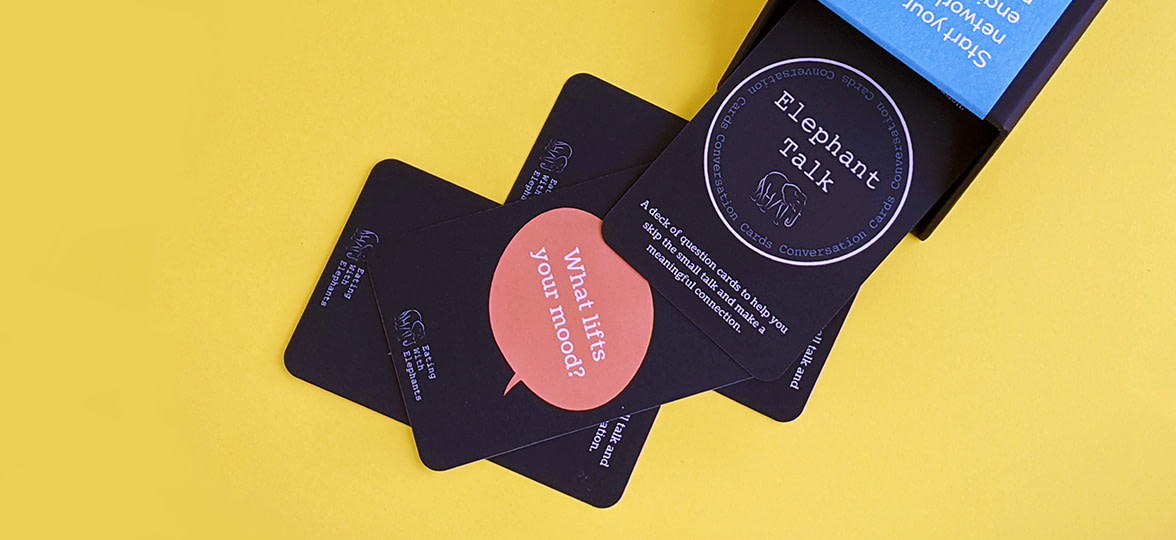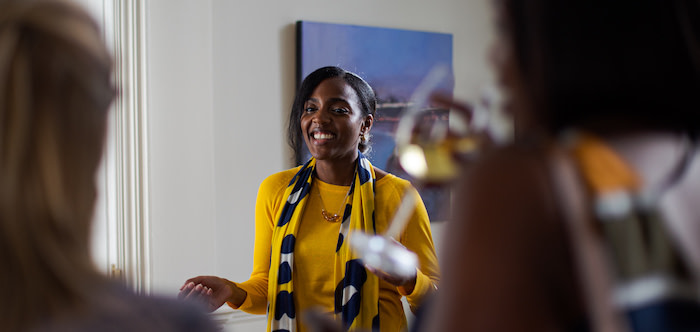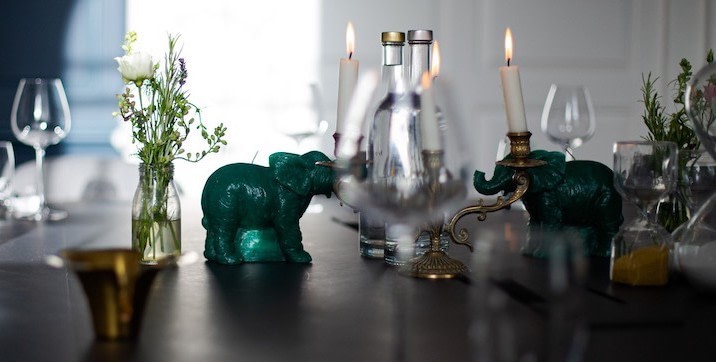Eating With Elephants: fighting loneliness with storytelling
We met Janice Johnson to talk about her innovative supper club that fights loneliness and stigma.

Concerned about the number of Londoners experiencing feelings of isolation, Janice Johnson decided to address the elephant in the room with a storytelling supper club, reconnecting the city through good food and true stories.
We met Janice to talk about her innovative supper club that fights loneliness and stigma, and how she adapted her concept in a time of pandemic and greater social isolation.
Tell us about yourself and your background as an activist and storyteller.
I am a facilitator, coach and social learning experience designer. I work with individuals and organisations to build trust, resolve conflict and identify the unspoken roots of problems that prevent true belonging, connection and meaningful collaboration.
I’ve always loved stories, especially real, honest human experiences told from the heart. Our stories are the thing all of us have in common. For better or worse they’re all around us: newspapers, magazines, conversations overheard on buses and trains. But when it comes to the tough stuff, the stories that are difficult to tell, we tend to try and hide those away instead of saying how we really feel. I’ve felt like that myself and, as a coach, I’ve worked with lots of clients who’ve felt that way too, so I decided to try and work to change that.
Our stories are the thing all of us have in common.
Now, my work is all about tackling loneliness and social isolation. It’s a massive problem, not just in the UK, but globally. Even before the coronavirus pandemic, it was called a “silent epidemic” and one of the most major public health crises of our generation. I’m hugely passionate about raising awareness about loneliness and isolation because too many people assume it’s something that just affects older people, when it really isn’t at all. Loneliness affects 1 in 3 people and can happen at any point in their lifetime. So if you’re in a room of 12 people, at least four of them are lonely – and loneliness comes with serious health risks.
Can you tell us more about your supper club, Eating With Elephants? How did you come up with the idea?
I was concerned about how many people – not just my coaching clients – were experiencing loneliness because of the shame and fear they felt about their experiences. They’re emotions that all of us have about experiences we shouldn’t be ashamed of, but because they’re so stigmatised, we’re too scared to talk about them and we push them to the back of our minds. I wanted to do something to change things.
So I did a year-long research project into how stories could create a pathway to connection by enabling people to talk about the things that they were trying to hide. It was fascinating. I learned so much about traditional storytelling cultures, ancient storytelling practices and modern methods of creating connection. Food and comfort were a big part of that. I put that research together with my own background and developed Eating With Elephants.
Life isn’t always Instagram-perfect, but we’re in it together because we all have our elephants in the room.
The concept? A storytelling supper club reconnecting the loneliest city in the world through good food and true stories. A group of strangers meet over dinner and each tell a story about their “elephant in the room”. They’re uncomfortable themes to talk about like guilt, shame or jealousy, but the comfortable environment makes it easier to share how you feel. We recreate the magical atmosphere that you get from telling stories around a campfire, with candlelight and a meal shared family-style around a big round dinner table.
By the end of the night, the group of people who come along leave feeling less like strangers and more like friends. It’s always unique. You can share, listen, laugh, cry, vent, learn and connect as each person tells their story. You’ll leave knowing that life isn’t always Instagram-perfect, but we’re in it together because we all have our elephants in the room.
What was the biggest challenge you encountered when bringing your concept to life?
The concept wasn’t something that I had come across anywhere else, so trying to find examples of similar organisations or projects that I could learn from was difficult. I had to do a lot of searching before I found peers working on similar topics that I could talk to. I met some great people whose advice was invaluable and helped me build my project.
Once I’d developed my idea a bit more, I wanted to test it out in real life. I really believed in the concept, but I had no idea whether or not anyone else would. It was really hard work to get pilot dinners up and running. I did everything by word of mouth at first, getting a few people together at home or in a restaurant where I wouldn’t have huge venue hire costs. It was only once I had tested it fully and changed some things that needed to work better that I could focus on finding a long-term home for Eating With Elephants.
How do you think storytelling can help fight loneliness and stigma?
Loneliness and isolation are some of the biggest issues faced by our generation. We’re more technologically connected, but – even before the pandemic – we’ve been growing more socially disconnected than ever before. Social media creates a massive barrier to connection. We’re constantly bombarded with images of “perfection”. When you look around and everyone seems to be living their best life 24/7, you feel like you have to put on a front. It’s rare to see people being authentic about how they really feel. It’s not part of UK culture to be vulnerable and open so that other people can see if you’re struggling.
When you look around and everyone seems to be living their best life 24/7, you feel like you have to put on a front.
“Stiff upper lip” syndrome means feelings like shame, loneliness and depression are stigmatised as if they shouldn’t ever be spoken about. That makes it even harder to get help if you go through a difficult experience in life. You put on a front and pretend as if your life is constantly fun, happy and glamorous. You’re never fully connecting, always trying to hide your feelings as if they’re an elephant in the room – everyone knows it’s there, but no one is brave enough to talk about it.
The longer you try to hide the elephant in the room, the bigger it gets, the worse it feels and the more difficult it is to address. Storytelling makes that a lot easier, because it acts as a connector without necessarily having to feel as exposed and scared to share your experiences. This method is rooted in traditional indigenous cultures of storytelling that have been creating connection for years, and helps people work with their emotions instead of “facing” them or “fighting” them. It’s a much more comfortable way to have uncomfortable conversations.
What’s your favourite part of the supper club?
The feeling people have when they come to a dinner. There’s nothing more meaningful than seeing the lightbulb moments people have when they listen to everyone else’s stories and realise that they’re not alone.
Most people are incredibly nervous and apprehensive, but they still come, and I think that’s really brave. That’s why the conversation cards we print through MOO are so important. They cut out awkward small talk moments and take the pressure off attendees, so they don’t have to try and think up things to say when they’re already quite nervous. One of the most beautiful things to witness is the way nervousness disappears throughout the evening and you see people who came as strangers leave feeling more like friends. People have described it as life-changing and I genuinely believe that it really is.
The coronavirus outbreak reinforced feelings of loneliness for isolated and marginalised people. How did you adapt your concept in a time of pandemic to address this?
Like many businesses and organisations planning events, we moved from in-person dinners to hosting events online. I created Elephants At Home – an online version of the Eating With Elephants dinner – to give people a chance to stay connected while apart during the pandemic.
The Eating With Elephants ethos is to create deep connections, so it’s always been important that our events and experiences are as tech-free as possible. I wanted to make sure that Elephants At Home had the same atmosphere, so I created some printed materials and connected with a meal delivery service to put together a storytelling supper club in a box. The box includes candles to create the same magical atmosphere we use at Eating With Elephants dinners, all the storytelling tools, plus a delicious meal and a cocktail or mocktail to enjoy at home. They’ve worked really well – better than I could have hoped for!
How did you approach your promotion strategy to attract a wider audience for Eating With Elephants?
Actually, I was really lucky. The pilot events went amazingly well, so I had a great start. The feedback was so good that it spread by word of mouth really quickly, which was great.
There’s only so much you can do on your own though, so my approach has always been to collaborate as much as possible. Two heads are definitely better than one! I joined a peer-learning accelerator called Enrol Yourself where I met a whole network of people who I’ve collaborated with in many different ways. I also used the accelerator as a platform to experiment, get feedback to keep adapting to what people wanted and connect to more people and organisations I could partner with. Partnering up means more opportunities, a wider audience and more support.
Partnering up means more opportunities, a wider audience and more support.
I had videos and photography done quite early on, which I’d really recommend. My visuals made it much easier for people to connect with the concept and get a good feel for what it’s like to actually be at a dinner. I built the website myself, so having high-quality photographs was a must – it makes a huge, huge difference. The photography clearly shows what we’re about, makes the site look professional and builds trust, which encourages people to book tickets to an event.
How do you use MOO to reach more people?
MOO has helped us reach far more people, firstly with the conversation cards we use at the events – they’re now also a key part of the Elephants At Home events. They’ve helped us reach people all over the world, to experience the magic of Eating With Elephants. It’s been an absolute godsend. The MOO items in the boxes include:
- A deck of conversation cards you can use to skip small talk and have a meaningful face to-face conversation, which actually makes you feel connected to the person you’re speaking to. They’re also pretty versatile, the questions on the cards can double up as daily journal prompts, for connecting with yourself, and a way of creating deeper connections with friends, family or even strangers.
- A conversation menu to list everything included in the event.
- Round labels for the products in the box.
- Mini stickers, which I use as “stamps” on Elephants Mail – letters that attendees write to their future selves, which I send to them on the date they want to receive it in the future. Those are my favourite.
Do you have any projects coming up you’d like to share with us?
Yes! Free storytelling circles. They’re a shorter, simpler, free version of Eating With Elephants that happen during the daytime as well. It’s a supportive, completely judgement-free environment to just tell stories and connect with other people at a time that can be really difficult – especially if you live alone.
Walking With Elephants, a 30-day walking challenge built for connection. A group of people take daily walks guided by daily prompts and tools designed to increase connection.
I’m launching a podcast, which I’m really excited about. It’s a series of on-to-one conversations based on the Eating With Elephants storytelling format. Every episode features real people talking about real stories and listening to what they’ve learned along the way is pretty life-changing. I can’t wait for people to hear it!
I run storytelling training for corporates and nonprofits to help them get to know and connect with their employees in a way that actually works. I’ll be running more of those, too.
I also run a fundraising campaign for Brainstrust with one of my closest friends. We were both diagnosed with the same brain tumour, so now we run a campaign to raise funds and awareness so the charity can help more people like us to live well with a brain tumour.
Working from home can create feelings of isolation. Any advice for remote workers and freelancers struggling with loneliness?
- Make time to get offline and go outside every day. I think it’s so important, especially now, when the places you’d usually go to mix up your routine aren’t open. When I start to feel a bit stir crazy, I go for a walk. Even if it’s just 15 for minutes, I feel so much calmer and more refreshed when I get back.
- Try and sleep well and stick to a regular routine. The more out of sync you are with everyone around you, the less time you’ll be able to spend connecting with them and, if you’re tired, that will leave you feeling even more lonely.
- Try joining freelancer support networks and online co-working groups. They’re brilliant. You’ll connect with people who get what you’re going through. All freelancers struggle with loneliness at some point, so they’ll know how you feel and have useful advice to share.
- Sign up to an Eating With Elephants event! OK, I’m biased with this one, but giving yourself time to make genuine, meaningful connections with people is really rewarding and one of the best things you can do to feel less lonely.
Reconnect and give your community a beautiful brand experience at home with MOO’s custom marketing materials.
Keep in touch
Get design inspiration, business tips and special offers straight to your inbox with our MOOsletter, out every two weeks.














